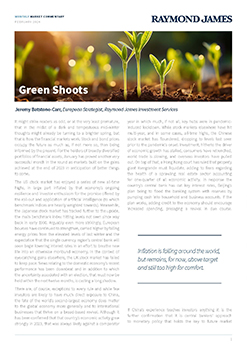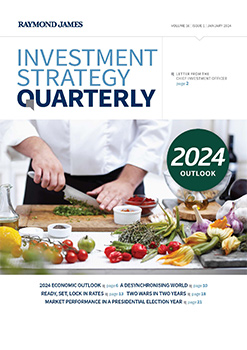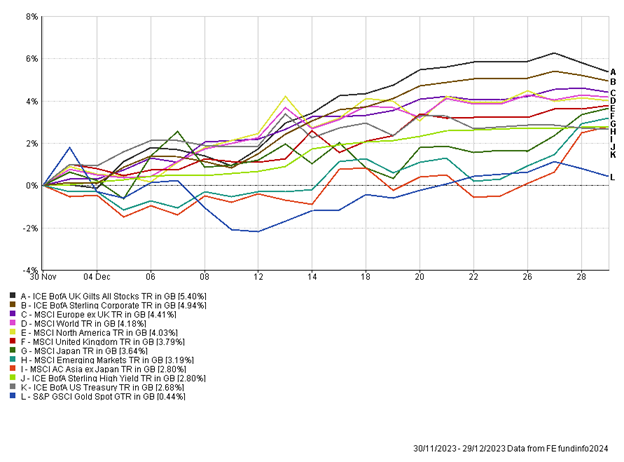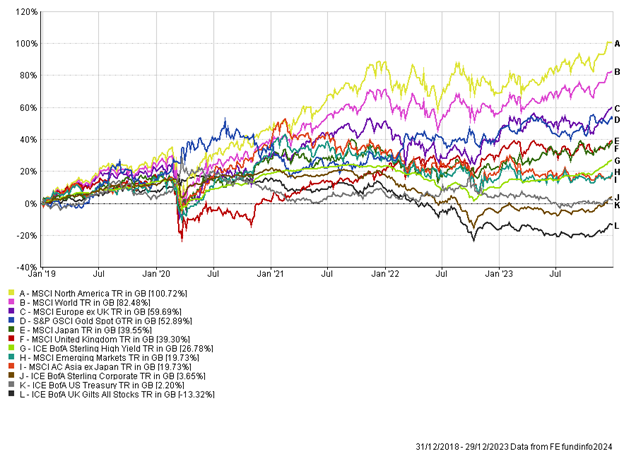In January we covered surprisingly weak UK retail sales, so H&M’s disappointing results this week weren’t necessarily unexpected. The Swedish clothing firm is popular in UK high streets and shopping centres but saw sales fall by 4% over December and January. This has led to CEO Helena Helmersson handing in her resignation, suggesting a change in leadership is required. H&M have struggled to compete with brands such as Zara and online fast fashion giant Shein, as they failed on profitability objectives resulting in closing stores and laying workers off.
The Bank of England met on Thursday afternoon, holding interest rates firm at 5.25%. It was expected that this first meeting of the year was too soon for any rate cuts to occur and only one Monetary Policy Committee member (MPC), Swati Dhingra opted for a cut. The voting was a three-way split as two members voted for a 25bps rise while the final six voted to keep rates stable. Governor Bailey mentioned there had been a “shift in the BoE’s thinking” towards inflation, unemployment and wage growth levels needed to be achieved before a pivot on policy; this led to investors pushing back expectations of a first rate cut to May.
The eurozone has narrowly avoided a recession with Q4 2023 growth coming in flat at 0%. Market expectations were that GDP would be negative at -0.1% and this was based on the two largest economies, Germany and France, contracting and posting no growth. The belief among investors is that the European Central Bank (ECB) will only cut rates at their next meeting if the US Fed cut rates over fears of devaluing the Euro. It seems evident that the ECB need to make a move in order to stimulate the eurozone.
On a more positive note, German inflation eased more than expected to 2.9% after December’s anticipated anomaly rise. Germany is the largest energy consumer in the Eurozone with high energy prices burdening their manufacturing industry however the recent drop in energy prices contributed to the fall in inflation. There will be another inflation print before the ECB’s next meeting in March so a falling trend could spur the ECB to make their move.
Germany and France are alike in another matter as both countries are seeing protests from farmers. There is a phrase “no country riots quite like the French” and the farmers are no exception. French farmers blocked major highways around Paris over pay disputes. Inflationary pressures have raised the costs of major inputs such as energy, fertiliser and transport and this has now been added to by excessive regulation. This put immediate pressure on newly appointed PM, Gabriel Attal, and he announced the scrapping of diesel tax increases for farmers and extra steps to reduce red tape on farmers.
Earnings season continued in the US and we saw mixed results from the so-called ‘Magnificent Seven’. Meta (Facebook) and Amazon posted better than expected results, with Meta even initiating a dividend, which sent share prices soaring after-hours. Apple’s results were underwhelming with concerns around China leading to growth fears; shares in the $3 trillion company dropped over 2% in after-hours trading.
US Non-Farm Payrolls data has just been released and surprised to the upside as 353,000 jobs were added to the economy in January. This came in almost double market expectations of 180,000. The continued strength of the labour market highlights the current resilience of the US economy and caused investors to question whether the Fed will need to cut rates in the near term. We witnessed US government bonds sell-off on the news.
On Thursday Formula One driver Lewis Hamilton, announced his decision to leave Mercedes at the end of the 2024 season, joining rivals Ferrari. The announcement of the seven-time world title winner joining coupled with a positive earnings report sent Ferrari stock up 11%, reaching an all-time high. The right driver in the right team can be a very powerful combination and indeed reflects some of the qualities we look for when selecting fund managers for our portfolios. We believe the right investment team is important, but that team must also operate in the right business (culture) in order to maximise and sustain performance.
Nathan Amaning, Investment Analyst
Risk warning: With investing, your capital is at risk. The value of investments and the income from them can go down as well as up and you may not recover the amount of your initial investment. Certain investments carry a higher degree of risk than others and are, therefore, unsuitable for some investors.







